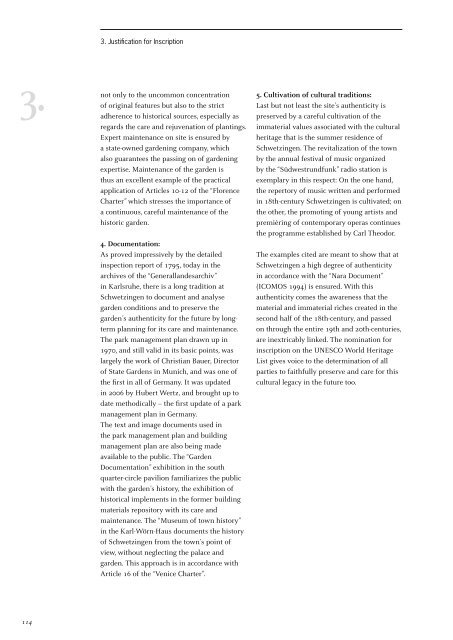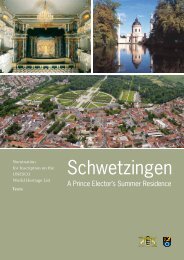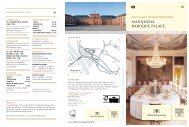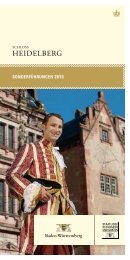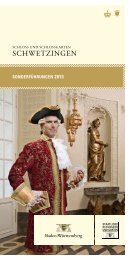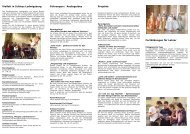3. - Schlösser-Magazin
3. - Schlösser-Magazin
3. - Schlösser-Magazin
Create successful ePaper yourself
Turn your PDF publications into a flip-book with our unique Google optimized e-Paper software.
<strong>3.</strong> not<br />
114<br />
<strong>3.</strong> Justification for Inscription<br />
only to the uncommon concentration<br />
of original features but also to the strict<br />
adherence to historical sources, especially as<br />
regards the care and rejuvenation of plantings.<br />
Expert maintenance on site is ensured by<br />
a state-owned gardening company, which<br />
also guarantees the passing on of gardening<br />
expertise. Maintenance of the garden is<br />
thus an excellent example of the practical<br />
application of Articles 10-12 of the “Florence<br />
Charter” which stresses the importance of<br />
a continuous, careful maintenance of the<br />
historic garden.<br />
4. Documentation:<br />
As proved impressively by the detailed<br />
inspection report of 1795, today in the<br />
archives of the “Generallandesarchiv”<br />
in Karlsruhe, there is a long tradition at<br />
Schwetzingen to document and analyse<br />
garden conditions and to preserve the<br />
garden’s authenticity for the future by longterm<br />
planning for its care and maintenance.<br />
The park management plan drawn up in<br />
1970, and still valid in its basic points, was<br />
largely the work of Christian Bauer, Director<br />
of State Gardens in Munich, and was one of<br />
the first in all of Germany. It was updated<br />
in 2006 by Hubert Wertz, and brought up to<br />
date methodically – the first update of a park<br />
management plan in Germany.<br />
The text and image documents used in<br />
the park management plan and building<br />
management plan are also being made<br />
available to the public. The “Garden<br />
Documentation” exhibition in the south<br />
quarter-circle pavilion familiarizes the public<br />
with the garden’s history, the exhibition of<br />
historical implements in the former building<br />
materials repository with its care and<br />
maintenance. The “Museum of town history”<br />
in the Karl-Wörn-Haus documents the history<br />
of Schwetzingen from the town’s point of<br />
view, without neglecting the palace and<br />
garden. This approach is in accordance with<br />
Article 16 of the “Venice Charter”.<br />
5. Cultivation of cultural traditions:<br />
Last but not least the site’s authenticity is<br />
preserved by a careful cultivation of the<br />
immaterial values associated with the cultural<br />
heritage that is the summer residence of<br />
Schwetzingen. The revitalization of the town<br />
by the annual festival of music organized<br />
by the “Südwestrundfunk” radio station is<br />
exemplary in this respect: On the one hand,<br />
the repertory of music written and performed<br />
in 18th-century Schwetzingen is cultivated; on<br />
the other, the promoting of young artists and<br />
premièring of contemporary operas continues<br />
the programme established by Carl Theodor.<br />
The examples cited are meant to show that at<br />
Schwetzingen a high degree of authenticity<br />
in accordance with the “Nara Document”<br />
(ICOMOS 1994) is ensured. With this<br />
authenticity comes the awareness that the<br />
material and immaterial riches created in the<br />
second half of the 18th-century, and passed<br />
on through the entire 19th and 20th-centuries,<br />
are inextricably linked. The nomination for<br />
inscription on the UNESCO World Heritage<br />
List gives voice to the determination of all<br />
parties to faithfully preserve and care for this<br />
cultural legacy in the future too.


